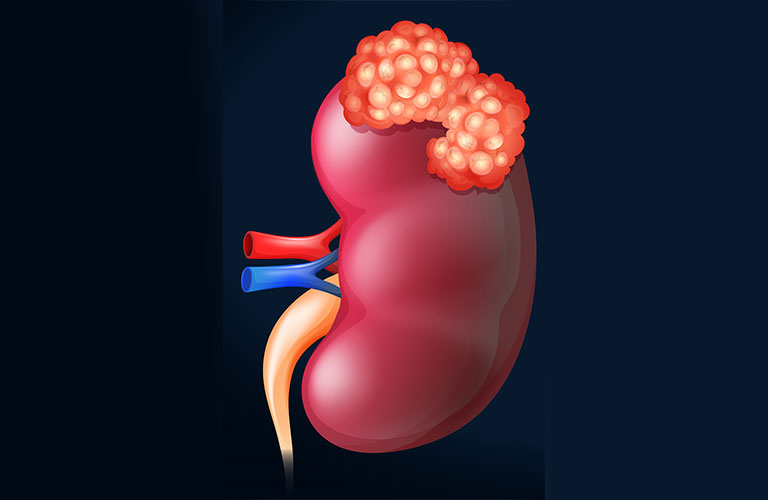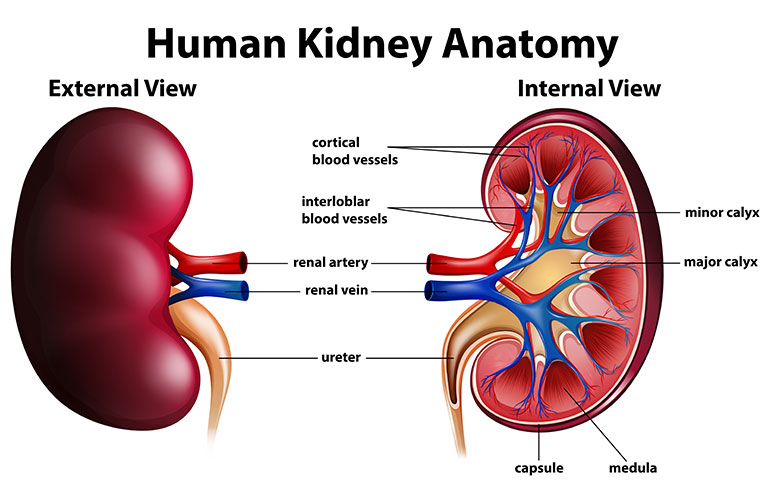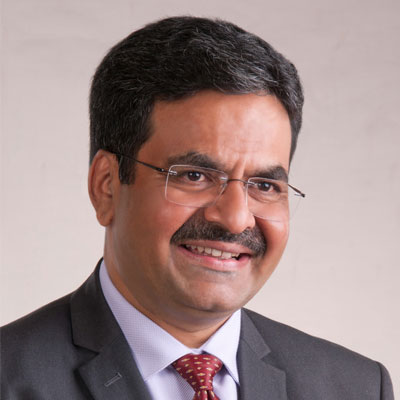Kidney cancer also called renal cancer develops when kidney cells change and grow rapidly forming tumors/masses. Kidney cancer is effectively treated at Aashray via treatment options such as Active Surveillance, Partial Nephrectomy, & Radical Nephrectomy.

The kidneys are two bean-shaped organs, each about the size of a small fist located above the waist on both sides of the spine. The main function of the kidneys is to filter blood. Kidneys also produce hormones that help control blood pressure, the production of red blood cells, and other bodily functions.

Kidney cancer also called renal cancer develops when kidney cells change and grow rapidly forming tumors/masses. Some kidney masses are benign (not cancerous) and some are malignant (cancerous).
Following are the main types of kidney cancer:
Anejaculation is defined as the inability to ejaculate semen. Men with this condition can produce sperm, and they might experience a normal orgasmic sensation, but no semen gets ejaculated through the penis during sexual climax. It can be a primary anejaculation- total absence of ejaculation from the beginning of the sexual response, or secondary anejaculation - having occasional or situational ejaculation issues.
Kidney cancer usually doesn't show any signs and symptoms in the early stages. The signs and symptoms may develop in a later period of time which includes:
The doctor usually recommends you the following tests and procedure to help diagnose kidney cancer:
The doctor will go through the complete medical history to understand symptoms and check for risk factors. A physical examination will also be conducted to check for the signs of kidney cancer.
A tumor grade tells how aggressive the cancer cells are in the body. A tumor stage tells how much has the cancer spread. Grades 1 through 4 show progressing severity with “1” being the lowest level and “4” the highest. A higher grade and more advanced stage usually comes with larger tumor size and more aggressive tumors. Tumor size helps in assessing the risk for cancer that is developing.
Kidney cancer is staged using the Tumor Node Metastases (TNM) system or Clinical staging system.
Tumor (T): How large is the primary tumor? To what extent is it spread?
Node (N): Has the tumor spread to the lymph nodes? If so, where and how many?
Metastasis (M): Has the cancer spread to other parts of the body? If so, where and to what extent?
These tumors include cancers of any size that are confined to the kidney.
In this stage, tumors are either locally invasive or involve lymph nodes.
In this stage, tumors have spread beyond the kidney into organs nearby or distant metastases.

The course of the treatment is decided when the patient and doctor together discuss the options and go through a process called “shared decision making”. Treatment options are decided based on several factors such as the cell type and stage of cancer, possible side effects, and the patient’s health, etc. Following are the four treatment options that are available for kidney cancer:
For active surveillance, the doctor will closely monitor the tumor with clinic examination and imaging studies. Active surveillance is considered for people who have small tumors (less than 3 cm in size).
This is an uncommonly performed procedure in our country for small sized tumors. A biopsy may be undertaken before ablation. There are two types of ablation:
A partial nephrectomy is the surgical removal of the tumor and the diseased part of the kidney. The doctor may recommend this procedure depending upon tumor size, patient's age, patient’s general condition, status of other kidney etc.
Radical nephrectomy is the surgical removal of the tumor, the entire kidney and surrounding tissue. This procedure is recommended by the doctor when the size of the tumor is very large and there is not much healthy tissue remaining.
The follow-ups are especially important in cases of cancers to manage side-effects and monitor the overall health, recovery progress as well as check for any signs that cancer has come back. So, follow-up care and active monitoring are essential. These include regular physical examinations, imaging tests and blood & urine tests.
Cancer rehabilitation and survivorship care are recommended, and this could mean any of a wide range of services that help people regain control over many aspects of their lives and remain as independent and productive as possible and these services may include physical therapy, career counseling, pain management, nutritional planning, financial counseling, and/or emotional counseling.


Dr. Ashit Shah is a senior consultant Urologist heading Aashray Urology Institute. After completing his M.B.B.S. and M.S. in General Surgery, he was awarded Diplomate of National Board (D.N.B.) in Genito-Urinary Surgery by the National Board of Examinations, New Delhi. He earned his Diplomate in Laparoscopic Urology from Louis Pasteur University, Strasbourg, France in the year 2006. Dr. Shah has a special interest in Endo-Urology, especially Urolithiasis i.e. Urinary Stone Disease. Having spent more than 27 years in the profession of Urology, he has experience of over 75,000 urological consultations and more than 15,000 surgeries. Being counted amongst the torch bearers of ethical and transparent medical practice in the city of Vadodara, he was conferred ‘Inspiring Urologist Award’ for the year 2019 by The Economic Times.